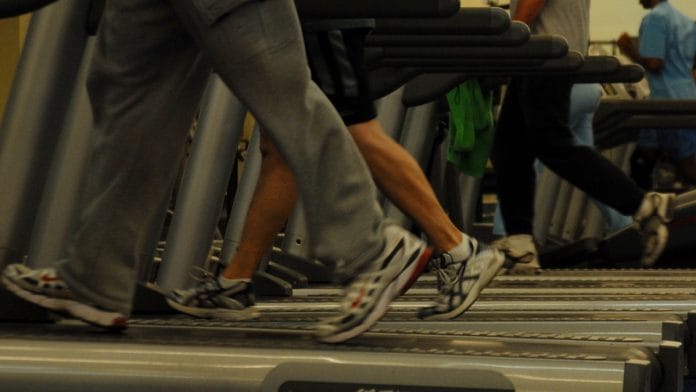For many effeminate gay men like me, the gym becomes a one-day affair; we never return to the place again.
Is seeking physical fitness at the gym also a cis-het privilege? Gyms have slowly become a heteronormative space where queer people feel estranged.
I had a similar experience when I tried to seek a space for myself in that macho zone; it didn’t suit the cis-het men around me.
Stares everywhere
When I entered a gym for the first time, uncanny stares followed me everywhere. On the treadmill, if I was conscious of the way I was running, the men around made me more uncomfortable with their grins. I was insecure about how my body moved. Two women kept looking at me, nudging at each other and laughing constantly.
In the end, I got down from the treadmill. Spaces aren’t made unsafe by men alone, women also contribute to it at times.
When the trainer told me to do a dumbbell bench press, I picked up a couple of 2.5 kg dumbbells. A buff guy, laughing with his friend, said, “Give him at least 5 kg. He is a man.” My trainer replied, “He is different”. The “different” is still stuck in my head. What did he mean by that? How could he differentiate me from other men?
I focused on my workout but the men constantly made fun of me. So I paused that exercise and started another one. When I went back to the bench press, one of them passed by, grinning. Extremely anxious, I quickly left the gym.
A queer friend of mine went through a similar experience. “Being a queer person, I have felt seen by people throughout my life and I always know the difference between a good and bad stare. It took a lot for me to start going to the gym,” he told me.
Also read: Bodybuilding in NCR goes high on fake steroids in search of quick abs
The idea alone is scary
If you are a gay man with effeminate characteristics, choosing to work on your physical fitness comes with a multitude of difficulties, even before you step inside a gym. The term “gym” directs us to a space of bulky cis-het men showing off their weight lifts and biceps, laughing aloud, and exuding extreme masculinity.
I always wanted to go to the gym but never dared to confront my insecurities about my body. When I finally decided to do it, I kept it a secret for a long time. I couldn’t gather the courage to tell people around me because I knew what was coming my way.
I still remember sharing this with two of my very close friends. The confession was met with amazement and laughter. “We can never imagine the ‘gay’ you going to the gym,” one of them said. I was shocked to hear that.
My friends found it difficult to believe that the skinny gay guy who doesn’t even walk like a ‘man’, has joined the gym. Their reaction made me more conscious of sharing this with other friends. What is funny for them forms deep-rooted insecurities for gay men like me.
Also read: How ‘shy girl’ workouts can help women gain confidence — minimal gym space, only dumbbells
The ideal body type
If a man goes to the gym, his sole motive isn’t always to come out with six-pack abs. This was the case with me as well. The definition of fitness differs from person to person. I don’t want a buff body; I want to be lean so I can wear a crop top in my college fest.
This is one of the reasons I work out with two women friends who want to lose weight. However, am I allowed to say that out loud? Can I say that I want to work on my glutes solely for aesthetic reasons? If I express that, won’t my version of fitness be looked down upon because it doesn’t match the ideal body type for cis-het men?
My experience at the gym is not an isolated one. Fellow queers and trans folks are similarly anxious to enter this man-ruled territory. For many of us, a treadmill may become a source of lifelong trauma. Made to feel uncomfortable and unwelcome, we don’t return to the gym the next day.
Some of us, though, choose to stand our ground despite all this. “With constant stares,” said my friend, “it sometimes becomes difficult to work out but I am not leaving the gym. I am here to work on myself and I shall do so.”
Jatin Chahar interned with ThePrint. Views are personal.
(Edited by Prasanna Bachchhav)







Can there be regulations from government to make public space a bit more inclusive? Not for just gay people but also for woman etc. People in this country will take centuries to change if there isn’t intervention. Sad to see our moral circle can not even include our own country people, let alone others.